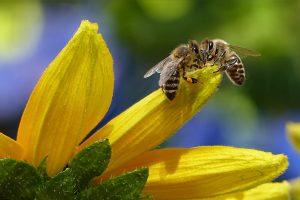 As the weather warms up and insect activity increases, both outdoor enthusiasts and casual lawn-goers alike are faced with similar challenges: how to manage mosquito populations without harming beneficial insects in the process. Protecting bees and other pollinators doesn’t require sacrificing your summer to the indoors, or risking discomfort and disease from feeding mosquitoes. Through incorporating preventative measures and the responsible application of products, it is possible to take your yard back from mosquitoes without dangerously impacting your local pollinators.
As the weather warms up and insect activity increases, both outdoor enthusiasts and casual lawn-goers alike are faced with similar challenges: how to manage mosquito populations without harming beneficial insects in the process. Protecting bees and other pollinators doesn’t require sacrificing your summer to the indoors, or risking discomfort and disease from feeding mosquitoes. Through incorporating preventative measures and the responsible application of products, it is possible to take your yard back from mosquitoes without dangerously impacting your local pollinators.
The Importance of Protecting Pollinators
The global decline in pollinator species -- both in diversity and population -- is widespread cause for concern. Insect pollinators play an essential role in the reproduction of many wild and food crop plant species, and bees in particular contribute to the success of the world’s most important human food crops. However, wild and domestic bee numbers have been dropping over the last decades, with losses as high as 54% in parts of Europe. Several causes are believed to contribute to pollinator decline: habitat loss, parasites and disease, improper pesticide application, and environmental damage have all been cited as factors. As a result, pollinator stewardship has emerged as a new conservation goal among landowners.
Human Health and Mosquito Control
Other human-insect interactions present more negative consequences. Itchy bites make mosquitoes an outdoor nuisance, but their ability to spread disease also makes mosquito control an issue of public health. Mosquito-borne diseases include the Zika virus, malaria, West Nile virus, several types of encephalitis, and dog heartworm. Diseases transmitted by mosquitoes kill humans and animals every year, and sustained mosquito management is necessary to prevent outbreaks. People can decrease exposure by wearing long clothing outdoors and screening areas indoors, but the most effective form of mosquito control is prevention. Mosquitoes need standing water to breed, and eliminating these breeding sites reduces populations around the home and work areas. Remove debris from ditches and yards, clean gutters, flip over or store objects that may hold rainwater, put drain holes in outdoor containers, and change the water in bird baths twice a week.
A Responsible Approach to Pesticide Application
Chemical mosquito abatement is also an option. Larvicidal products can be used to treat areas where standing water may gather, and the treatment either kills aquatic mosquito larvae or prevents them from emerging as adults. Adulticide is usually distributed as a fog; regardless of whether an adulticide is botanical or a conventional pesticide, it can be harmful to bees if applied incorrectly. Responsible, mosquito-targeted application is key to reducing dangerous insect populations while protecting bees and other pollinators. Flowering plants that attract pollinators can be covered or avoided during treatments, and the application should focus on foliage, the ground, and shady, dense areas that mosquitoes prefer. Understanding the life cycles of insects and how they interact with the environment helps reduce the amount of pesticide required to be successful, and a complete, integrated pest management system is always more effective than a chemical treatment alone.
Professional Solutions
With pollinator numbers dropping, it is more important than ever to protect our wild and domesticated bee species. At the same time, mosquito management for comfort and safety is an issue that impacts human health worldwide. Both concerns can be addressed through a combination of research, proactive measures, and the responsible application of the correct organic mosquito control treatment.
If mosquitoes are chasing you inside, but you’re reluctant to put your local bee population at risk, contact the integrated pest management professionals at Mosquito Tek of Norfolk. We are happy to arm you with knowledge and supply you with practical steps you can take to reduce pest populations around the home, plus supplement your actions with technology and products that may not be available to the public. Together, you and your neighborhood pollinators can both enjoy the summer.
Comments
Post a Comment